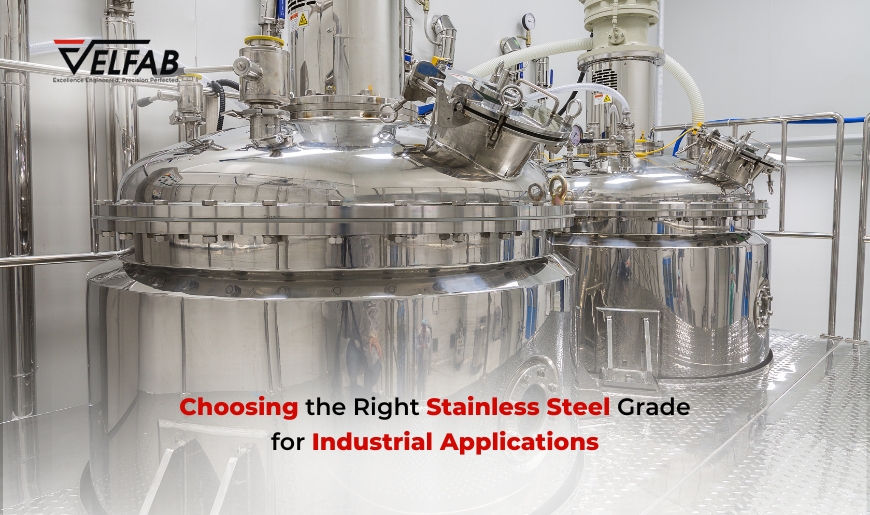Choosing the Right Stainless Steel Grade for Industrial Applications

When it comes to industrial applications, choosing the right stainless steel grade is more than just picking a metal—it’s about ensuring durability, efficiency, and long-term performance. With so many stainless steel grades available, it can be overwhelming to determine which one is best suited for your needs. Whether you’re in manufacturing, construction, or engineering, selecting the right grade can save you from costly replacements and maintenance headaches.
At Velfab Engineers, we understand the critical role stainless steel plays in various industries, from medical devices to semiconductor manufacturing. So, let’s break it down and make the selection process easier for you.
What Makes Stainless Steel So Versatile?
Stainless steel, an alloy mainly composed of iron and at least 10.5% chromium, offers exceptional resistance to rust and corrosion thanks to the thin protective layer formed by chromium. Each grade of stainless steel brings unique properties to the table, with varying strengths, limitations, and ideal applications tailored to specific needs
Here’s a quick look at the three main categories of stainless steel:
- Austenitic stainless steels are the most widely used type, celebrated for their outstanding corrosion resistance and remarkable flexibility. Popular grades like 304 and 316 fall within this category, making them a trusted choice across various industries.
- Ferritic stainless steels are a cost-effective option with magnetic properties, making them a popular choice for automotive components and industrial uses.
- Martensitic Stainless Steels are high in strength and hardness, making them great for tools and high-wear applications.
In Australia, industries rely on around 30 different stainless steel grades, depending on the specific environmental and mechanical requirements.
Tips for Selecting the Ideal Stainless Steel Grade
Choosing the right stainless steel grade for industrial applications requires careful consideration of several factors:
1. Corrosion Resistance
Applications exposed to moisture, chemicals, or saltwater, such as marine environments, require a grade with exceptional corrosion resistance. In these challenging conditions, 316 stainless steel emerges as the ideal choice.
2. Strength & Durability
For applications requiring extra strength, like heavy-duty machinery, you might consider martensitic or duplex stainless steels, which offer superior mechanical properties.
3. Temperature Resistance
If your equipment operates at high temperatures, selecting a heat-resistant grade is essential to prevent warping or degradation over time.
4. Ease of Fabrication
Certain stainless steel grades offer greater ease in welding, cutting, and forming. Among them, austenitic stainless steels, such as grade 304, stand out for their exceptional workability and widespread application.
5. Cost-Effectiveness
Higher grades may offer better performance, but they also come at a higher price. Striking a balance between performance and budget is key.
Stainless Steel Grades Commonly Used in Australia
In Australia, the stainless steel grades commonly utilized include:
- Grade 304 is a highly versatile option with excellent corrosion resistance, making it a reliable choice for kitchen equipment, piping, and construction projects.
- Grade 316 provides superior corrosion resistance, making it perfectly suited for use in marine settings and chemical processing applications.
- Duplex Stainless Steels is a mix of austenitic and ferritic stainless steel, offering higher strength and improved resistance to stress corrosion cracking.
Whether you’re working in heavy industry, food processing, or medical technology, there’s a stainless steel grade that fits your needs.
How Velfab Engineers Can Help
At Velfab Engineers, we work with high-quality stainless steel grades to manufacture precision components for a range of industries.
Semiconductor Industry
In high-tech environments like semiconductor manufacturing, precision and cleanliness are critical. We use high-purity stainless steel to produce components that meet industry standards, ensuring smooth and efficient operations.
Medical Device Industry
For surgical tools and implants, we use medical-grade stainless steel and titanium, ensuring durability and biocompatibility. Our components are designed to meet stringent healthcare requirements.
Our expertise extends beyond just manufacturing—we help clients select the right materials to ensure optimal performance and longevity.
Final Thoughts
Choosing the right stainless steel grade for industrial applications doesn’t have to be complicated. By understanding your specific needs—whether it’s corrosion resistance, strength, or ease of fabrication—you can make an informed decision that ensures long-term reliability.
At Velfab Engineers, we’re here to guide you through the process, offering high-quality stainless steel solutions tailored to your industry. If you need expert advice or custom stainless steel components, get in touch with us today!


